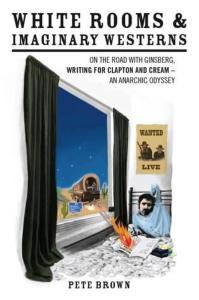End of the Hippie
Era
During the seventies
Brown continued writing with Jack Bruce, while diversifying into A & R work
for Deram, Decca’s ‘hip’ subsidiary. His personal life had
diversified too, involving children from previous relationships and a long-term
relationship with Sue that was becoming problematic, owing to ‘ a greed
for new places and faces, something that took a long time to control.’
The new places
included the Hyatt House in Los Angeles, where Led Zeppelin had ridden
motorbikes around the corridors. Brown had been tasked to work on Bruce’s
album ‘ Out of the Storm’ at the Record Plant. But ‘there was an
end-of-hippie era desperate party atmosphere permeating the place which
undermined the work with drugs.’ Only Stevie Wonder in the studio next
door seemed immune. Indeed, Malcolm Cecil, the UK synth pioneer who was
producing Stevie, offered Pete the opportunity to write for him. Pete refrained
because of his loyalty to Jack, then going through a narcotics crisis. It
remains one of rock’s alternative histories, in parallel with another
recurrent theme of the book, intriguing unreleased albums, like the big band
jazz tracks that Mick Jagger was putting down in another part of the building.
The Bruce album was eventually completed in the UK, despite Pete and Jack
nearly drowning in a boating accident off the Aran Isles.
After the demise of
another short-lived band, The Flying Tigers, he made more American trips. A
meeting with Martin Scorcese, fortuitously a Cream fan, planted the notion of
screen-writing, but he was still trying to cope with the excesses of the music
business, exemplified by Ike Turner. ‘ There was a small ante-room before
you got to his flat, where a tray of coke came out of the wall electronically,
and you had to partake before he let you in.’ Another celebrated paranoiac
was Sly Stone, who kept panthers and crocodiles on the premises to deter
unwanted visitors.
Back in the UK by
1977, Pete put together another group, Back to Front, but the scene was
changing. Record executives started telling him that his jazz-tinged music with
its fondness for complex time structures and elliptical lyrics was dead in the
water. Punk had arrived. The critical consensus about punk, expressed by
writers like Jon Savage in ‘England’s Dreaming’, is that it was
a spontaneous grass-roots phenomenon created by alienated working class youth
who felt socially marginalized and excluded from the music industry. Brown
however inverts the paradigm and sees it as a cynical strategy devised by the
music industry – and the fashion business – to exploit desperate
unemployed ‘scab labour’ and/or create fake working class bands
‘to invoke the sympathy of wealthier middle class punters’, betraying
skill and talent in the process. It’s an interpretation that fits very
neatly with the self-proclaimed nihilism of Malcolm McClaren and his
protégé/victim Sid Vicious or the irony of Joe Strummer’s
public-school background. One could also argue that the chaos of punk also
created opportunities for new talents to emerge but that would have cut little
ice with Pete at the time, who decided to make a strategic retreat and try
writing for the screen for a while.
Road of Cobras
From the eighties to
the present, Pete’s career has continued on its picaresque way, veering
between cult acclaim and obscurity, random affluence and sudden fiscal crisis.
Film credits have included the animated ‘Felix the Cat’ and the BBC
TV drama ‘Railhouse Jock’, commissioned but never transmitted .
Indeed many projects, like a documentary drama about Glaswegian rocker Alex
Harvey, remain in development limbo. However he’s produced outstanding
albums with ex-Bond saxophonist Dick Heckstall-Smith (now sadly dead), with
Peter Green, Rory Gallagher (dead) and many others, often contributing as
percussionist. There’s been a band, the Interociters – named after
the alien machine in the old sci-fi classic ‘This Island Earth’ - and
an ongoing partnership with keyboardist Phil Ryan, which recently produced the
album ‘Road of Cobras’, an apt metaphor for the human condition,
especially in the music business. Having survived a cancer scare and a heart
by-pass, he’s still ready for the road and even does poetry readings.
Many books have
exhumed the counter-culture of the sixties and the rock demi-monde, like the
memoirs of Barry Miles. What makes ‘White Rooms’ so enjoyable is the
vivid recall, the candour and the energy. To quote one of his favourite blues
singers, Screaming Jay Hawkins: ‘ I don’t care if you don’t want
me, I’m yours...’
Paul A. Green
January 2012
««
MEDIA
COURT |

|






